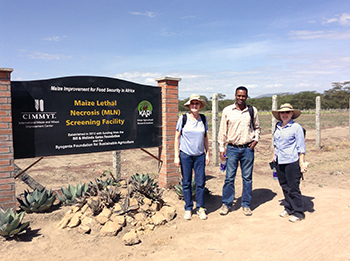Latest News Archive
Please select Category, Year, and then Month to display items
04 April 2024
|
Story Lunga Luthuli
|
Photo SUPPLIED
 Dr Juliet Kamwendo champions gender-inclusive climate action in Africa. Her expertise at the recently held AFR100 workshop highlighted vital steps towards sustainable and equitable development.
Dr Juliet Kamwendo champions gender-inclusive climate action in Africa. Her expertise at the recently held AFR100 workshop highlighted vital steps towards sustainable and equitable development.
Dr Juliet Kamwendo, Lecturer and Programme Director for Gender Studies in the Centre for Gender and Africa Studies at the University of the Free State, is spearheading efforts to integrate gender considerations into Africa's climate restoration agenda. Reflecting on her involvement, Dr Kamwendo stated, "This is particularly crucial, as women make up almost 50% of the population in Africa, and the depletion and degradation of land affect them disproportionately."
She recently served as a gender expert at the AUDA-NEPAD AFR100 workshop in Ouagadougou, Burkina Faso, from 25 to 29 March 2024. This initiative aims to restore forests and degraded land across Africa by 2030, with a focus on gender equality.
The workshop emphasised the integration of gender perspectives into the AFR100 project, acknowledging the disproportionate impact of land degradation on women. Dr Kamwendo's expertise highlighted the need to empower women in climate change interventions, addressing existing gender inequalities exacerbated by environmental degradation.
“Women – who are primarily responsible for household food security and water provision – bear the brunt of environmental degradation, leading to increased workloads, reduced income opportunities, and heightened vulnerability to climate-related disasters. Furthermore, the loss of forest cover and biodiversity further exacerbates the challenges faced by women, particularly in rural areas where they depend heavily on natural resources for their livelihoods,” added Dr Kamwendo.
Her participation highlights academia's crucial role in fostering inclusive and sustainable development, emphasising interdisciplinary collaboration to tackle complex environmental challenges. Through initiatives such as AFR100, stakeholders are working towards a more resilient and gender-responsive future for Africa.
Maize breeder rewarded for his research to enhance food security in Africa
2016-08-26

Prof Maryke Labuschagne from the UFS Department
of Plant Sciences, Berhanu Tadesse Ertiro, a
postgraduate student in Plant breeding at the UFS,
and Dr Peg Redinbaugh of the US Department of
Agriculture in Wooster, Ohio.
Photo: Supplied
Ethiopia is one of the African countries, deeply affected by food insecurity. Berhanu Tadesse Ertiro, a citizen from Ethiopia started his career - after graduating with his undergraduate degree in 2003 - as a junior maize breeder. Today he is pursuing his doctorate degree in Plant Breeding at the University of the Free State (UFS).
His research had made some great strides in contributing to food security in Africa. He recently received a fellowship from the prestigious Norman E. Borlaug Leadership Enhancement in Agriculture Program (Borlaug LEAP).
This fellowship is only awarded to students whose research has relevance to the national development of the student’s home country or region. The aim of these fellowships are to enhance the quality of thesis research of graduate students from developing countries who show strong promise as leaders in the field of agriculture and related disciplines.
Low soil fertility a major maize production constraint
Berhanu is also a visiting student at the International Maize and Wheat Improvement Center (CIMMYT) in Kenya, where he is running field experiments for his PhD thesis dissertation. His research focuses on Nitrogen Use Efficiency (NUE) and Maize Lethal Necrosis (MLN) disease tolerance. Low soil fertility and MLN are among the major maize production constraints in eastern and southern Africa, where maize is staple food.
Such hybrids have the potential to contribute greatly
towards food security among farmers and their
families through increased productivity.
The use of new tools could increase breeding efficiency and reduce the time needed for the release of new stress tolerant hybrids. Such hybrids have the potential to contribute greatly towards food security among farmers and their families through increased productivity. Berhanu is looking at the feasibility of genome wide selection for improvement of NUE in tropical maize.
Fellowship includes mentorship and supervision across borders
The programme supports engaging a mentor at a United States university and Consortium of International Agricultural Research Centers (CGIAR). During his fellowship, he will be supervised and mentored by Prof Maryke Labuschagne of the UFS, Prof Rex Bernando, a professor of Corn Breeding and Genetics at the University of Minnesota and Dr Biswanath Das of CIMMYT, Kenya.
As a LEAP fellow, Berhanu was invited to attend the 30th Annual World Food Prize events to take place in October 2016, in Des Moines, Iowa. The week will include his attendance at the Board for International Food and Agricultural Development meeting, participation at side-events at the Borlaug Dialogue International Symposium and the World Food Prize.